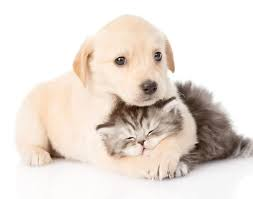Watch Where You Are Walking
Hope is like a hairball trembling from its birth...
Animal Doc AM-Multi-Media-Dr. Don DeForge
11September2012
Have you ever gotten up in the morning and felt your bare foot slide onto a "gooey" substance that seemed to be laced with fiber? If you have, you have become one of America's veteran "hairball" compressors.
How do cat's develop hairballs? Healthy cats are fastidious groomers. When the cat grooms itself, the barb like structures on their tongue grab loose hair and it is swallowed. Most hair is expelled with the cats stool during normal transit through the gastrointestinal tract. Some hair can get trapped in the stomach. This leads to the cat having a vomiting episode to expel the hair. The esophagus or food tube that connects the mouth with the stomach restricts the hair on its way out of the stomach causing a tube like material to be expelled. Many times the hairball is trapped in the stomach and only food and stomach contents are expelled.
If the vomiting episodes are frequent, you must contact your local veterinarian [LDVM] to be sure that no other problems are present besides hairballs. The doctor may want to take an x-ray or run some lab tests.
Other problems that can cause vomiting in the cat are:
- Liver Problems
- Kidney Problems
- Pancreas Problems
- Diabetes
- Thyroid Disease
- Parasites
- Cancer
- Food Allergy
- Bacterial and/or Viral Gastroenteritis
- Foreign objects being swallowed and trapped in the stomach or intestines
- Blockages of the bowels themselves
- Feline Asthma
- Pulmonary Problems than mimic dry heaving but are respiratory in nature
- Feline Heartworm
- Ingesting house plants-be careful some house plants such as lilies are highly toxic to cats-visit: www.ASPCA.org/apcc to find out about toxic house plants to cats
If your doctor feels you are dealing with a hairball problem, there are many choices for treatment:
- Prescription Lubricant/Laxatives that are given orally to help the hair pass out of the stomach into the intestines--you must follow carefully your doctor's recommendations on the usage of these products
- Regular Grooming with the usage of a cat deshedder
- Fiber supplements added to the diet
- Special Cat foods that are high in fiber-Check with your veterinarian about these diets
- Prescription Medicines which assist in allowing the hair ball to freely move from stomach to Intestines
- Hairball Treats-the negative part is that it requires a large number of these to be ingested each day for them to be effective in the control of hairballs
- Add natural fiber to your cat's diet-i.e. canned pumpkin, squash, or squash baby food
It is very important not to personally diagnose vomiting as a hairball problem in your cat and try to treat it on your own with over the counter or natural products. You must seek the help of your veterinarian to be sure no other serious problems are present. Infrequently, large or multiple hair balls can occur that need surgical removal. Even though uncommon this does occur.
Some signs to look for in the vomiting cat that may point to a more serious problem than just hairballs:
- Vomiting every day or more than three times a day many times per week
- A painful belly or swollen belly
- Poor appetite
- Losing weight
- A general unthrifty appearance
- Drinking excessive water
- Urinating frequently
- An exaggerated appetite with no weight gain
- Blood in the vomit
- Blood in the stool
- Frequent vomiting without producing a hairball
- Coughing or gagging without producing a hairball
Your veterinarian is your health care advocate. He/she may want to perform an Abdominal Ultrasound, take x-rays, or run a series of tests. Be proactive; seek veterinary consultation before your cat becomes very ill; and most importantly become a good defective and monitor your cats behavior and eating habits each day. Remember, you are your pet's home-advocate. Be vigilant and be sure to provide a pain-free quality of life each and every day to the cat that you love.
Dr. Don DeForge
Animal Doc AM Multi-Media
11September 2012
Silver Sands Veterinary Center
203-877-3221
www.SilverSandsVeterinary.com
DoctorDeForge@yahoo.com
Visit us on Facebook at Silver Sands Veterinary

Comments
Post a Comment